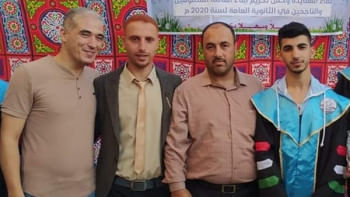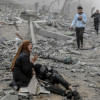Applause and amnesia: No Other Land’s Oscar win

The Academy awarded its Oscar for Best Documentary Feature to No Other Land on March 3. Palestinian activist Basel Adra, 28, shot most of the documentary on his camcorder from 2019 to 2023, showing the Israeli military's destruction of his hometown, Masafer Yatta, a small region in the southern occupied West Bank. Basel made the film with Israeli journalist Yuval Abraham.
First things first, this award didn't validate No Other Land—it validated the Oscars. Hollywood, once in a while, needs a moment like this to assure itself that it is inclusive, welcoming, and engaged with the world's pressing realities. From now on, the Academy can point to this moment with fervent glee. After all, I imagine nothing can be worse for the elite liberals than being dubbed complicit.
Meanwhile, the very system that congratulates No Other Land refuses to screen it. Even online streaming platforms in the US have not shown interest, despite No Other Land being the highest-grossing Oscar-nominated documentary. Streaming giants that host countless war films and violent cinema spanning all genres remain silent. Netflix, which removed 24 Palestinian films from its archive in October 2024, has shown no interest. So, while the Academy basks in its "bravery," the film remains inaccessible to most American audiences.
Yuval told The New York Times in an interview published on February 19, "In the US, so many people are writing to us, 'How can we watch it?' So we decided to do the theatrical release independently, and it's now going to show in about 100 theatres in the US."
It also has to be pointed out that the documentary doesn't centre on a land where the impact of Israeli aggression is beyond measure. It breaks my heart to write this, but no matter how painful the situation of Masafer Yatta is, considering the rest of Palestine, it is one of the less impacted places by the Israeli occupation. The documentary is not about Khan Yunis, Rafah, or Al-Shifa Hospital in Gaza City. It's not about Al-Mawasi, nor about Al-Zahraa, Al-Mughraqa, and Wadi Gaza—three towns now declared uninhabitable, as Al-Zahraa's mayor, Nidal Nassar, said in a press conference on February 10.
In Basel's camera, the documentary shows the Israeli military coming to the village with demolition orders at regular intervals. They don't demolish the whole village in one go. They go one home at a time. This has been one of the settlers' strategies since the beginning. The purpose is to break the spirits and dignity of the people and make this process "invisible" to the world. I guess Israeli authorities gradually learned how little the world chooses to see anyway.
They say these demolition orders are to make way for tank training and army barracks—where they will train more soldiers, who will then march into more homes with more demolition orders.
At one point in the documentary, to the question, "Don't you have anywhere else to go?," a mother says, "I have no other land. It's our land." She is Basel's mother. When the Israeli military arrives in the middle of the night to arrest Basel, she says, "Go wear a warmer coat. It's cold"—like mothers do, you know? I know that mother; perhaps you do too. The mother, knowing that construction was forbidden and a school couldn't be built, came up with a brilliant idea. Women and children, who are less likely to get arrested, would build during the day, while men would work only at night. That's how the school, Basel went to, was built.
I have to mention Tony Blair's seven-minute stroll here. When Blair visited Masafer Yatta, Israel later cancelled the demolition of schools and homes along the streets he walked. "This is a story of power," Basel says. The trauma and pain of Masafer Yatta weren't enough to stop the destruction—but a seven-minute walk by Tony Blair was. Of course, once the aura of a British prime minister's walk wore off, the demolitions resumed.
This is not a film about history—this is happening right now. When No Other Land won the Berlinale, Berlin Mayor Kai Wegner said, "Anti-Semitism has no place in Berlin, and that also applies to the art scene," adding, "Berlin is firmly on Israel's side." I can no longer be astonished by the West—I cannot ask questions like, "How can anyone become anti-Semitic by just showing what's been happening?" I understand and have been educated: in Berlinale or the Oscars, the sense of morality is spectacle-deep.
The Oscars have a long history of rewarding politically charged films while perfectly maintaining the status quo that these films often critique as the antagonist. When Marlon Brando won Best Actor in 1973, he chose Native American activist Sacheen Littlefeather to receive the award in his place. She was booed on stage while speaking against Hollywood's treatment of Indigenous peoples. Fifty years later, No Other Land is honoured. Ironically, nothing about No Other Land changed because of the documentary's Oscar win. The land in question remains contested, bulldozers remain on standby, and the world remains comfortable with a neatly packaged tragedy. The Academy, of course, will move on. It has done its job. It has awarded. It has absolved itself.
Just one last thing—the film was released months after the deadly Hamas-led attacks in southern Israel on October 7, 2023, which triggered Israel's renewed destruction of Gaza. At least 1,100 people were killed in the attacks in Israel, and about 240 people were taken captive. By the time a ceasefire took effect in Gaza on January 19, 2025, more than 48,000 Palestinians had been killed in the war. An estimated 13,000 additional people are buried under the rubble and presumed dead, according to Al Jazeera. Basel always sleeps with his shoes on—the army can come and drag anyone out of their home at any time. I am adamant and hold my feet to the ground. I have divorced my hope from reason, and what I dream is this—Basel sleeping without his shoes on.
Sumaya Mashrufa is manager to executive director's office at Friendship.
Views expressed in this article are the author's own.
Follow The Daily Star Opinion on Facebook for the latest opinions, commentaries, and analyses by experts and professionals. To contribute your article or letter to The Daily Star Opinion, see our guidelines for submission.

 For all latest news, follow The Daily Star's Google News channel.
For all latest news, follow The Daily Star's Google News channel. 










Comments